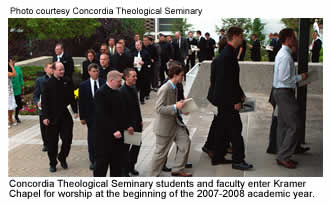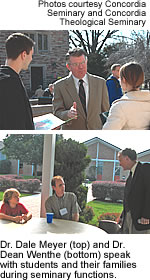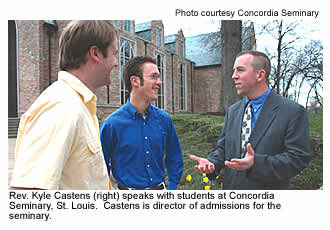Shepherd the flock of God that is among you, exercising oversight, not under compulsion, but willingly, as God would have you; not for shameful gain, but eagerly; not domineering over those in your charge, but being examples to the flock. —1 Peter 5:2 ESV
by Roland Lovstad

“Diverse” is an apt description of the ministries and locations to which today’s pastors and missionaries bring the message of God’s forgiveness and life in Jesus Christ.
So, how does a seminary prepare future pastors for these diverse contexts?
“We can only do the most important things while we have the students on campus or under our tutelage,” says Dr. Dale Meyer, president of Concordia Seminary, St. Louis.
Those “important things,” he says, are to give students a foundation of theological knowledge and a desire to sensitively adapt to their situations. In Meyer’s words, it is imparting a “curious love for people and a curious love of God.”
A similar answer comes from Dr. Dean O. Wenthe, president of Concordia Theological Seminary, Fort Wayne, where faculty have shaped a curriculum designed to form able ministers of the Gospel in today’s context.
Historically, the Synod’s seminaries were “heavily Germanic,” observes Wenthe. “And we basically downloaded information—you know, Greek, Hebrew, dogmatics. When the church was of one cultural background, that was very effective.”
But the culture has changed dramatically, Wenthe continues.
“That’s why we have to do more than just fill up the head,” he says. “So we’re trying to build a kind of mental and spiritual agility into our students to know who they are and the context where the Lord has placed them—then to present the confession in ways that can be heard and considered and, under God’s grace, blessed.”
Meyer says, “I tell my students, this is about you and your salvation. If you are on this curious quest to know more about God and your salvation—and to know more about people—then you are going to be a more relevant pastor.
“It’s a dandy time to be out there in the ministry; it’s a joyous time,” he adds. “People today are battered from pillar to post by emotions. They want something that is stable, like Hebrews says, ‘an anchor for the soul.’ And we’ve got it.”
Wenthe agrees. He cites two challenges for men who are deciding whether to invest their lives in the pastoral ministry.
“One is the larger cultural contest between light and darkness,” he says. “The dark fruits of Satan are becoming more visible in the violence and the loss of human significance. To be a messenger that every man and woman and child counts in the drama of creation is, to me, the foundational reason to consider the ministry.
 “The second reason is the church’s need,” Wenthe continues. “Unless the actuarial tables are really in error, that need is growing.”
“The second reason is the church’s need,” Wenthe continues. “Unless the actuarial tables are really in error, that need is growing.”
Wenthe hopes renewal of esprit de corps and camaraderie among pastors and church workers also will attract more men to pastoral ministry. He and Meyer want to see the seminaries be “renewal agents” by demonstrating enthusiasm and affection for the mission of the church.
“I’d love to see the seminaries be one of the greatest unifying forces of the church to support the LCMS President and the Council of Presidents,” Wenthe says.
Unifying and teaching the church will be on the agenda when the seminary boards of regents participate in a retreat in June with LCMS President Gerald B. Kieschnick.
Meyer and Wenthe say the seminaries are eager to offer their faculties’ expertise as resources to congregations—for pastors and laity. In addition, advances in technology will make distance learning and continuing education more economical to deliver.
Financial support continues to be an issue for the educational process that forms future pastors and deaconesses at the seminaries. Interviewed separately, Meyer and Wenthe both spoke to a common misconception that the seminaries are well funded from the national budget of the Synod.
Wenthe says people tend to think the seminaries are in “high cotton.” However, he notes that the Synod provides only 1.5 percent of the Fort Wayne operating budget through its traditional subsidy model. Direct gifts supply more than half of the annual budgets at both seminaries.
“We cannot depend on subsidy from the budget of the Synod to fund the aspirations and dreams of the people for mission and ministry in the future,” says Meyer. Still, he expresses optimism because the people of the church instinctively know seminaries are important.
While students receive financial aid to help with tuition, they have additional expenses for housing, groceries, and clothing. More than half the students are married and many have children. Often they also carry debt from undergraduate education.
Contributions to support seminary education are appreciated, and Meyer adds that congregations also need to provide adequate salaries for their pastors: “Our students wouldn’t mind incurring some debt in their desire to become pastors if they know they can pay it off at the end.”
“The harvest is plentiful but the laborers are few; therefore pray earnestly to the Lord of the harvest to send out laborers into His harvest.’ —Matt. 9:37–38 ESV

As the Lord calls workers for the harvest, the whole church has a role in identifying, encouraging, and assisting men as they consider and pursue the pastoral ministry.
“We look at it as if we’re one big team—pastors, laity and seminaries—in this particular area of the Lord’s ministry,” says Rev. Kyle Castens, director of admissions at Concordia Seminary, St. Louis. “We see ourselves as those who go out into the trenches, but also as those who help and equip the pastors and the laity.”
Rev. Scott Stiegemeyer, director of admissions at Concordia Theological Seminary, Fort Wayne, adds, “To some extent, it’s vocational counseling as we help men think through the process. We help people overcome obstacles.”
By the time a man contacts the seminary, it’s likely he has given pastoral ministry a lot of thought. Often the prospective student wants to know if he should pursue seminary study.
On the question of call, Castens turns conversation to the “earnest desire” that St. Paul writes about in his first letter to Timothy. “The call is something solid,” Castens adds, “That’s what will come in April during their fourth year in seminary.”
Stiegemeyer suggests that the pastor of their home church may be the best place to begin the “how do I know” kinds of questions. Sometimes the advice of an outside objective person is helpful. If a man is married, he also should be discussing the topic with his wife.
The traditional route to becoming a pastor is to first obtain a bachelor’s degree from an accredited college or university. Majors in liberal arts—history, philosophy, theology, English, communications—are good preparation.
The seminary involves another four years of study leading to a master of divinity degree. Seminarians learn Greek and Hebrew in order to study the Scriptures in the original languages. Their study includes three years on campus, including “field work” in a local parish. Vicarage, typically during the third year of study, is a one-year learning experience in a congregation.
The life transitions are huge, say the admissions officers. Uprooting family can be traumatic—something that isn’t done lightly.
“Since we do require a bachelor’s degree, it is not uncommon for students to enter the seminary with significant educational debt,” Stiegemeyer remarks. “If we can talk to them early, we advise how they can fund their undergraduate education. We encourage people to take out as few loans as possible.”
The seminaries develop financial-aid packages based on their resources, but the admissions officers also encourage men to explore sources like local grants or scholarships for graduate study or financial support from home and neighboring congregations.
Castens recommends having a “whole house” in order, whether it may be outstanding debt or a wife’s uncertainty about the move, or other issues. He says the seminary may, “out of love,” decline an applicant. “We may tell an applicant to wait until things are more stable because we want him to enter the ministry on the strongest possible footing.”
Stiegemeyer encourages the church-at-large to follow Christ’s instruction to pray to the Lord of the harvest to send workers. “I would call upon congregations to continue to pray for future workers and to give sacrificially to our seminaries,” he says. “Our Synod is blessed to have two outstanding institutions to prepare men for the pastoral ministry.”
For More Information
- Concordia Theological Seminary, Fort Wayne: www.ctsfw.edu
- Concordia Seminary, St. Louis: www.csl.edu
- LCMS Board for Pastoral Education: www.LCMS.org/PastoralEducation
10 Ideas to Encourage Future Pastors
 Here are ways you and your congregation can encourage men to consider pastoral ministry. (The ideas also apply to encouraging men and women to consider other full-time church-work vocations.)
Here are ways you and your congregation can encourage men to consider pastoral ministry. (The ideas also apply to encouraging men and women to consider other full-time church-work vocations.)
- Pray that the Lord will raise up workers for His harvest field (Luke 10:2). Pray for those who consider pastoral ministry, for those who study at our seminaries, and for those who serve as pastors.
- Your congregational life is a model. Does your congregation show affection for your pastor? Does he exhibit affection for the congregation? Do you pay your workers adequately, encourage vacations, and support their continuing education?
- By their example and encouragement, professional church workers can plant the seed of serving as a pastor in a young man’s heart and encourage its growth as the years pass by allowing him to serve in meaningful ways.
- Both seminaries offer on-campus opportunities for men—whether high school, college age, or older—to experience seminary life. Consider underwriting the travel costs for a man from your congregation.
- Conduct annual Sunday emphases highlighting church-work vocations. Include information about the Synod’s colleges and seminaries. Provide a place where members can obtain materials about church vocations and the Synod’s educational institutions.
- As a parent, help your son explore opportunities for pastoral ministry. Encourage without pushing. Provide an example with personal and family devotions and Bible reading, and pray that the Holy Spirit guide your son.
- Regularly promote and support a scholarship fund for students who attend college with intent to pursue churchwork vocations. Bequests and special gifts can be used to establish an endowment for scholarships.
- Offer verbal encouragement to those who have the gifts for pastoral ministry and exhibit a life consistent with Scripture’s description of the pastor. Encourage them to talk with their pastor and to contact the seminaries.
- As individuals, church groups, or a congregation, consider how you can regularly donate to one or both of the seminaries or to the Synod’s Joint Seminary Fund.
- Encourage young people to participate in youth group, district, and national youth gatherings, and other opportunities to experience the wider church.





